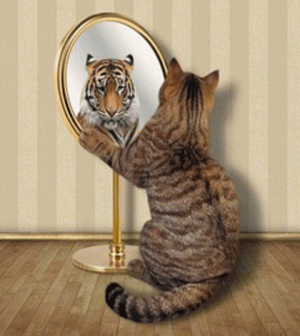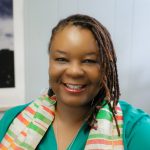- Finding Unshakable Power in a World That Wants to Pull Us ApartPosted 4 months ago
- What could a Donald Trump presidency mean for abortion rights?Posted 4 months ago
- Financial Empowerment: The Game-Changer for Women in Relationships and BeyondPosted 5 months ago
- Mental Health and Wellbeing Tips During and After PregnancyPosted 5 months ago
- Fall Renewal: Step outside your Comfort Zone & Experience Vibrant ChangePosted 6 months ago
- Women Entrepreneurs Need Support SystemsPosted 6 months ago
MIRROR, MIRROR, Who Am I? Developing the Inner World and Self

By Mensimah Shabazz, PhD
Every time I look into the mirror, I have different reactions to what I see. I have often seen the color of my eyes change and I have questioned whether it was real or my imagination. I have noted different degrees of puffiness around my eyes and questioned whether it was only fatigue or was I ill? I have occasionally observed the aging process and I have taken that for what it was. I acknowledge that I have a connection to the image in the mirror all the time. It is a true and fair representation of who I am.
I believe that the response to the various images, the apparent physical changes and subsequent reactions to them, also depend largely on my mental, emotional, and spiritual states. It is fair to state that we all have a personal relationship with the mirror and at one point in time we may have asked:
“Who am I? Am I that image in the mirror? How do I fit into the universe? What is beauty, and why does it move me?”
History tells us that from ancient civilizations such as Egypt and Greece, to native cultures, the mirror had relevance and a dual purpose: to see who we are and to see how we appear. In Greek mythology, Narcissus was so enamored his reflection that it destroyed him. It was believed that the gods viewed his behavior as atypical and expressed their anger by turning him into a flower. Another version of this mythical story focuses on the perspective of the lake, which saw its beauty in Narcissus’ eyes.
The mirror, however, is not made to reflect the world of opposites—people see beauty in what is beautiful and as it is represented. The mirror, as an imperfect object, flips images from left to right, but never up or down. Some may argue that it does not flip images from one side to the other but rather from the front to the back. In other words, we should not take to heart everything we see magnified in the mirror. Some of the reflections have psychological relevance to the way we view our images in the mirror—from self-recognition to total lack of recognition, as in cases with people with disorders.
In an effort to explain the impact of mirrors in our lives, I conducted a non-scientific survey amongst some of my former coworkers and the results were interesting. I asked the following questions and received these answers:
Can you function without a mirror? If yes, explain how. If no, explain how that will impact the way you see yourself.
“Yes, because I love others as I want to be loved. I am sure someone will warn me if I am not looking well.” (A)
“I could not live without a mirror for cosmetic purposes (tweezing eyebrows, makeup etc.). Otherwise I don’t need a mirror to see who I am.” (B)
“No. the mirror offers reassurance before going into the outside world.” (C)
“Yes. When I go camping and there are no mirrors I have no thoughts or regard for them. I camp for about two days at a time.” (D)
“Yes, I do not depend on seeing myself. It does not represent a whole lot. I dress in the dark.” (E)
Do you think there are psychological issues related to how you see and interpret your reflection in the mirror? Please explain:
“I do not think so. However, I believe that the mirror is not that important. The scale I use to weigh myself is within me. I am comfortable without the mirror.” (A)
“There are psychological aspects when looking at oneself. We, as a society, put so much worth in to beauty.” (B)
“Yes. The mirror helps to reassure and evaluate thresholds of acceptability. There are many mirrors that one sees throughout the day. The presence of these mirrors forces you to reflect and therefore interpret your reflections. It would be almost impossible not to see your reflection in most daily situations.” (C)
“Yes. When I think of what I look like, I think I’m better looking than the image in the mirror (and certainly in photographs). But such is life. (D)
“Maybe—avoiding image because I see my weight gain. Conscious of the way I look.” (E)
There are contradictions in some of the statements above. In (C), it is obvious that there is a level of comfort with her associations with the mirror and the extent to which it is expressed does not seem excessive or under-represented. However, in reviewing the answer for (E), it is certain that the choice to dress in the dark is not mainly because it is a preference. There is a reminder that she is not comfortable with her body image. It is therefore not a choice but avoidance and herein lies the psychological issues. (B) stresses the need to have a mirror for cosmetic purposes but indicates at the same time that society places too much emphasis on beauty. Such dichotomies demonstrate our confusion and/or complexities with our relationship the mirror and self.
We often get caught in difficult life situations and we shift gears to deal with outcomes. We are also subjected to a level of social conditioning that erases some of our natural vivacity at an early age. The attitudes we develop from this conditioning affect our health and our ability to heal prevalent issues in our lives.
David Whyte in The Heart Aroused notes that in time, we begin to “cultivate a lifestyle that does not require our presence.” If our attention continues to dwell on the psychological pressures, we begin to lose sight of ourselves. When we do that, it may be the beginning of splits from our personality that result in mental disorders, low self esteem, and self-deprecation. These conditions may lead to more serious forms of not recognizing who we are, both mentally and physically. Consequently, our image in the mirror will be distorted. To prevent this distortion, we need to take time to nurture our body, mind, and spirit.
It is pertinent to establish a spiritual practice that will assist with anchoring ourselves in a world full of pressure. Some may challenge that invoking Source to sustain and take us further on our journeys is an impossible or unnecessary task. However, in times of grief and tragic situations, we have found that with a connection to Source we are able to literally reach into our souls and pour out the painful emotions. The passion for connecting with Source can create this kind of paradigm shift that sustains us, which can be maintained by adopting three simple steps:
1. Stillness – going within everyday. It is the prerequisite to balancing the next steps.
2. Proaction – the necessity to exercise control in whatever we do (inner strength).
3. Creation – the process of dedicating mind, body and experiencing the magnificent versions of self
As spiritual beings, we have free will and power to change whatever we wish. It takes some work and placing tremendous resources in our effort to connect with Source is a way to deal with the important interaction between our physical nature and our spiritual being. It becomes a journey of love, and while on this journey of love, we are required to recognize our own presence and ability to make choices that cultivates the practice of unconditional love for all that we have been and for all that we are. I believe that our mental processes and emotions help us to transition, transform, and embrace who we truly are.
Being on a spiritual journey would not transform us into sainthood, but it will help us express our true feelings and express them with compassion. The only way to achieve the perfect image in the mirror is to stay true to self, recognizing that whatever image we see is a true reflection and representation of what is in our hearts and souls.
********
A native of Ghana, Mensimah Shabazz is the president of AGAPE Consulting, which focuses on women’s empowerment, and psycho-spirituality. She holds a Master’s Degree in Transpersonal Studies from Sofia University and a doctorate from the California Institute of Integral Studies’ Philosophy and Religion Program.
The author of Sankofa: Learning from Hindsight, Mensimah offers a unique perspective on spiritual living drawn from a variety of integrated resources—cultural background, education, and professional expertise. She brings a wealth of knowledge in how to balance life issues that will lead to self-healing and transformation.
She teaches clients how to stand in their own strength and to own a power from within that is greater than they have ever thought possible.
Mensimah’s purpose and vision is to facilitate her clients’ connection to Pure Source Energy and experience the jaw-dropping awesomeness of who they are.
Email her at — Agapeconsulting9@gmail.com Or connect with her on Facebook at:







